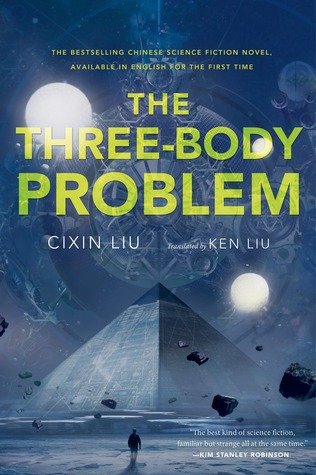An Unusual Review of China and a Book: The Three Body Problem
A book review can take many forms. Description of events that take place, notes about style, readers emotional response. This time I will try to do something different, and enter @didic's book review contest--a great idea for a contest, one that I would like to support by what I like best; by writing.
China
About two years ago I moved to China for a while, for work. I didn't know much about the country, except for things you can read in books. In Western books, I should add. I remembered some names from history class in high school, and one of my favorite movies/books take place in China... The Painted Veil by Somerset Maugham. I had seen Raise the Red Lantarn, a movie from 1991. But that may be about it. To prepare my move, I did see a great Dutch documentary by Ruben Terlou, a photographer who speaks fluent Chinese and traveled along the Yangtze to see what moves people.
But that didn't really prepare me for China. I'm not sure you can ever be prepared for a country so massive, so different, so rich. If there is one thing I learned from living there, it is that I don't know anything. I was a stranger in every aspect. My response was to figure out what was going on, by asking people questions that may or may not be acceptable. About whether they had brothers or sisters, if they would ever want to move back to the village they grew up in. Or, perhaps the most fatal question: had anything changed in the last 40 years.
Being Western, somewhat familiar with the rough concepts of communism - or at least the philosophical underpinnings - and having written my PhD on the topic of 'change' and what change means, I was not only interested in this, but also biased. Several people I talked to told me nothing had really changed. And perhaps they are right. Perhaps they have a different understanding of what change is.
As I had no internet at home, no television, no nothing really, I started to read a lot. And I asked people for books, books they'd recommend for me to find out more about the Chinese history. Fiction, preferably, not only as I love reading historical fiction, but also because fiction lets me experience something as if I'm right there, instead of telling me about what happened. What better way to learn about history, without making an effort?
But finding translated books that played in or were about the past fifty years in China was not easy. Some of the books I found were too Western, written by Chinese that had left China and could therefore not be considered truly Chinese anymore. I tried to stay out of any political discussions, and kept looking for good books to read. And one day a co-worker suggested the books by Liu Cixin: science-fiction.
The Book: The Three Body Problem by Liu Cixin

I never thought this would be possible, but a science fiction book that won the Hugo Award in 2015 turned out to be the most interesting book I've read, so far, about Chinese perspective on change, society and the direction of the future. It didn't only win many prizes, also the Chinese seem to really like these books. Even though there are huge elements of social critique and a portrayal of Chinese history that is not very positive. But perhaps that is how I read it, and not how Chinese read it.
I don't want to spoil this book, as it is way too good to stop people from having their own experience by reading it themselves. For a description of the book, I gladly refer to Goodreads, where you can also find a lot of reviews by people who try to spell out the contents of the book. I'm not very interested in that, as it doesn't make the core of a good book, especially not this one.
Which doesn't mean nothing happens in this book. A lot happens. Which makes a summary impossible. Perhaps The Three Body Problem is about the life of a scientist who figures out there is an alien civilization on the brink of destruction planning to invade earth. But at the same time that is not actually what makes this book interesting, or even what this book is about. It is about scientists who believe in what they do, in progress and development of their work. It is about mathematicians who try to figure out the 'Three Body Paradox', it is about a computer game which only the intellectual elite plays, through which we learn about something we'd rather not know. It is a detective story, in which frustrated police detectives try to get the help from aforementioned scientists to figure out why people end up dead.
But in the end, it is about the delicate balance between history and the future, between tradition and free thinking, between doing what you should and doing what you must. And it is about a specific Chinese take on all of this.
It is a book not only set in China, but is also Chinese in the way it approaches its subject. There are many layers, many stories that come together or they don't, with many elements that still surprise me to this day. Story-telling is a huge element in the book. The power of a story to convey something, without actually saying it. Which maybe explains why such a highly intelligent book, which speaks about the trials of thinking in a world that is focused on power, can become so successful. As such, this book is a kind of a miracle in itself, for bringing up critique while maintaining the stability of the status quo. It doesn't tell us about what to do, it shows us what happens when change is inevitable.
Further reading
The Three Body Problem is only the first book in a series. I haven't read the second and third part yet, but I'm greatly looking forward to it. If anyone has a suggestion of what else I could read to learn more about Chinese culture, history and life, please leave a note in the comment section below. Much appreciated.

Definitely need to check this out. I lived in China back in 2008 and it was such a different experience I was 20 so it was really the first time I was living on my own, but the most striking thing about living there was just how different the way of thinking is there. Not just in Beijing where I lived, but it was drastically different when you traveled elsewhere in the country as well. People think the US is so big and diverse that it really seems to contain a bunch of separate countries. Now take that and put thousands of years of culture ingrained in different parts of it.
Absolutely. I'm not American, so I cannot really compare those two - but after spending time in China, I definitely felt more European, the differences between European countries also far smaller than the difference with China. I hope you will enjoy the book, let me know when you've read it, will be interested to hear what you think about it!
What a great entry! Thanks for participating!
Thank you, looking forward to reading the other book reviews.